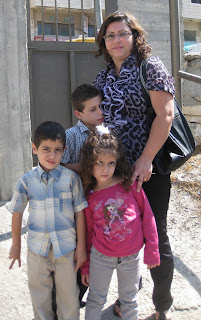 Stories are the fabric of our lives. They provide a reality check for our perceptions, help us envision what is possible and what we hope will never happen again, and often give us a dose of hope.
Stories are the fabric of our lives. They provide a reality check for our perceptions, help us envision what is possible and what we hope will never happen again, and often give us a dose of hope.Today in my small Arabic Presbyterian Church, I heard the most remarkable testimony about forgiveness as activism. Pauline Ayyad was widowed exactly 5 years ago when her husband Rami Ayyad was kidnapped and brutally murdered by Muslim extremists in Gaza. At the time, Pauline had two young children and was 4 months pregnant with her third. Running the only Christian bookstore in Gaza, Rami was targeted for his unwillingness to renounce Christ.
Pauline described in vivid detail the anger and rage she carried not only towards God but intensely towards Rami's killers. She was provoked by Christians who immediately encouraged her to forgive and even to pray for the conversion of his killers. With little hope for justice, she sank into a depression as she lashed out in her deep grief and pain.
She told a tender story of how God transformed her hatred bit by bit into eventual forgiveness and love for Rami's killers. As the first year unfolded, she gave birth to her daughter, Heaven, named for her trust that Rami was with God. She heard a pastor talk about the Good Samaritan and was convicted that in her real-life version of the story, Rami's killer was the person in distress. She wondered if she would ever be able to play the role of the Samaritan and minister to his needs. Over time, she became more deeply aware that she was God's daughter which assured her that all of her life. including Rami's, was held in God's gentle embrace. "All things work for good" became a promise she began to trust. And then came the day when she was finally able to let go of her hate. She spoke of an overwhelming sense of peace and freedom. Affection and love came much later.
While Rami's story depicts an extreme form of Islamic fundamentalism, it suggests some of the real challenges that Christians face here in the West Bank. In Gaza, where the population weighs in at nearly 1.8 million people, there are less than 3,000 Christians living there. While Bethlehem sports a Christian population of nearly 25%, in all of Israel/Palestine, the Arab Christian population is less than 2% of the total. Often caught in the economic and religious middle between the Jews in Israel and the Muslims in the West Bank, emigration is often perceived as the best option for the younger generation of Palestinian Christians. Sadly, this depletes the region of one its best assets. Christians are among the most educated and most politically moderate in this country. Israel/Palestine needs their wisdom, their bridge-building humility and grace. Tragically, in a land where Palestinian Christians were formerly a majority, many of churches on the various holy sites are now only shrines for pilgrims. There are few Christian congregations left to worship in these sacred places. A fear shared among the relatively robust Christian population in Bethlehem is that their churches will soon become religious relics rather than the vibrant worshipping heart of the living stones of Palestine.
This is why Pauline's story is so unique. Given the chance to emigrate, she has chosen to stay and is making it her mission to encourage others to forgive their oppressor and to remain in the West Bank as a vibrant Christian presence and witness. She believes that love will transform this land and this people.
I left church challenged to think and pray about who is on my "need to forgive" list. In my case, it is far less about individuals than it is about institutions and social/cultural constraints. I wonder if my complacency is holding me back from living more fully with God. Like a stopped-up pipe, my incalcitrance prevents a loving witness from flowing. What would it be like not to have to deal with all this unforgiving backwash and to live more forgivingly, more graciously, more lovingly? How would God's justice prevail if we all followed Pauline's lead?
Debbie, One of the things I most dreaded about you leaving for your sabbatical was how much I would miss your teaching and insights. Wherever you go, it seems that you always manage to find yourself at the intersection of pain and grace, with your crossing guard uniform on (tangerine, of course, not CalTrans orange), seeing people across that intersection or simply giving testimony that there is a safe crossing. Thank you for sharing Pauline's story and for being where you are to share what God is doing in Bethlehem and in your heart. hugs, Val
ReplyDelete